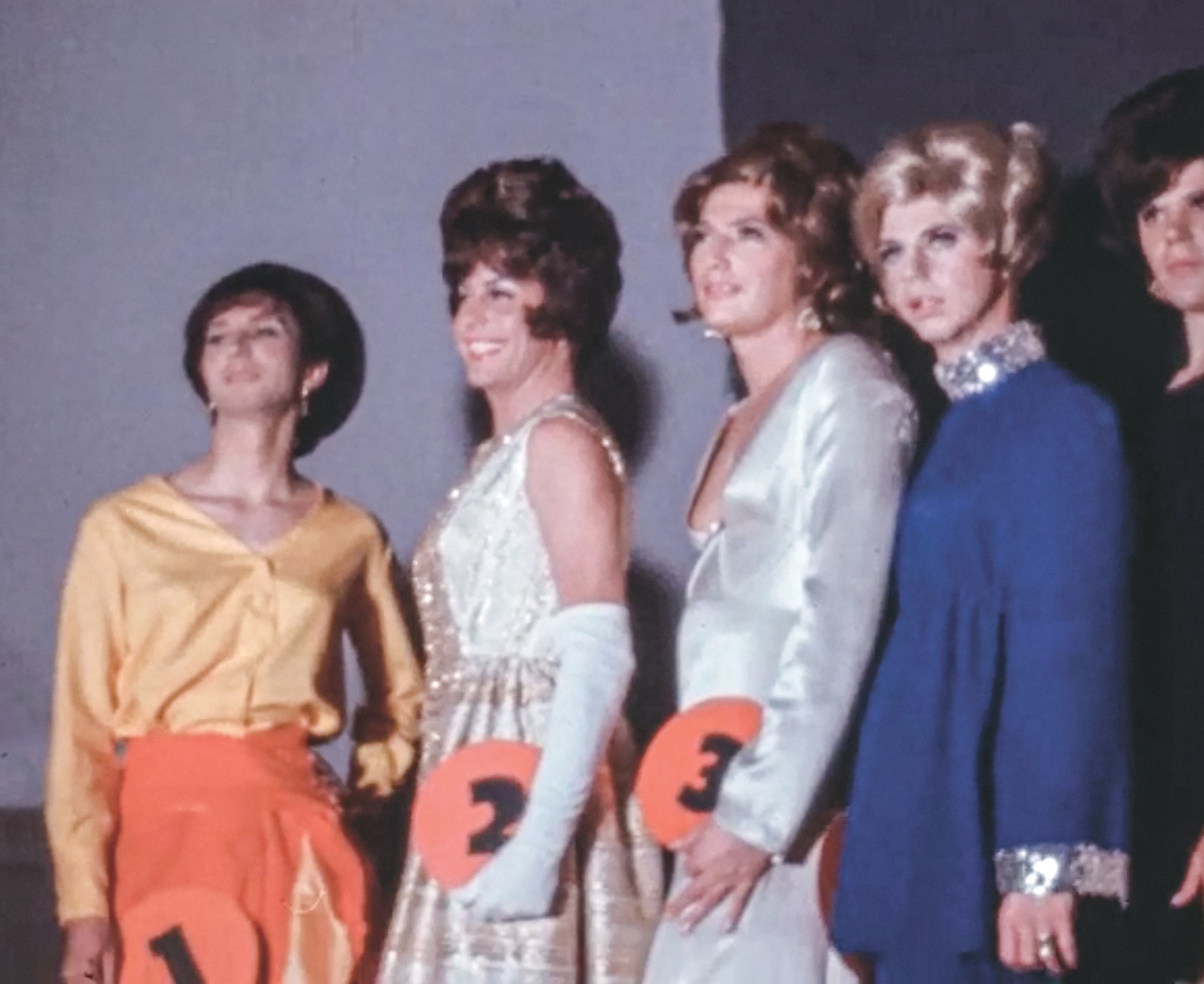Prologue: The Sound of You
By Patrick D. McDermott

Still from Miss Memphis Review, 1969, Reel 2. Courtesy the Mid-South LGBTQ+ Archive, MSS 537, OUT Memphis collection, Special Collections Department, University Libraries, University of Memphis © 1969 CinemArts. Photographed & edited by Mike Stevenson. Produced by William Kendall
In the fall of 1969—four months after the Stonewall uprising in New York and four miles from the motel where Martin Luther King Jr. was murdered the previous year—the Miss Memphis Review was held at the Guild Theater, a Poplar Avenue arthouse known for its transgressive programming. It was Memphis’s first public drag pageant. In a cunning act of scheduling, the theater’s outspoken manager Bill Kendall and his co-organizers planned the event for Halloween, the city’s one-night-only exception to strict anti-cross-dressing laws. Despite other active ordinances designed to criminalize queer expression, the evening progressed without incident—no police raids, no violence.
At least one filmmaker was tasked with documenting the pageant, and some reels have been digitized by the Mid-South LGBTQ+ Archive at the University of Memphis. Watching the footage today, I’m entranced by the mood, which strikes me as celebratory yet calm. The queens, who have names like Dee Dee and Cozette and Pearl, look radiant; their evening wear selections remind me of Mad Men’s Betty Draper, all high necklines and white gloves to the elbow. I watch as they apply makeup in big mirrors backstage, focused and flirty and unbothered, as if the cops might not barge in at any moment, as if nothing inside or outside of that Midtown theater can hurt them. As if the only thing to feel anxious about is whether their false eyelashes will stay in place when they step under the stage lights.
Since the film’s audio track has not yet been restored, the Miss Memphis Review videos that I watch are silent. I read online that there was live piano and organ accompaniment, though I don’t know what music was played while the girls took their turns down the runway, if it was elegant or cinematic or if it had a little swagger. But even without sound, the footage has its own kind of music. It’s there in the way a tipsy attendee poses for the cameraman, or when a queen in a tight gown spins with her arms out, gold sequins shimmering in unpredictable rhythms. I’m reminded of something Robert Greene II writes in his essay about the heritage of jookin’, the footwork-centric dance that sprang from the Memphis hip-hop scene: “Your feet become your instruments, your weapons, and your symbols of power and grace all at once.”
In a conversation with the culture writer Harris Wheless, Jerry Phillips explains the production philosophy he learned from his father, Sun Records founder Sam Phillips: “We’re not trying to copy anybody…we’re just trying to get a record of you. The sound of you.” When putting together the 2024 edition of our Southern Music Issue and its accompanying LP, we tried to prioritize a similar, Memphis-specific authenticity. We gravitated toward stories and songs that show how self-expression fuels innovation, or the specific magic that can happen when place and personality align.
I’m proud that we included fresh-feeling work about Memphis figures who are world renowned, like Elena Passarello’s deep dive into a bootleg of Elvis’s “worst” songs. But I’m also proud of the work that celebrates the scenes and artists whose impact is less documented, like the blues-punk songwriter and Alex Chilton collaborator Lorette Velvette, who Stephen Deusner writes “embodies a rebellious impulse that feels very local”; or the rap trailblazer DJ Spanish Fly, who recorded a 2024 remake of his lo-fi banger “Cement Shoes” for our LP. It would take many more issues to paint a comprehensive portrait of this city and all of its sounds, but I’m glad that we created something that looks and feels original. In a feature about the jukebox industry, Robert Gordon writes: “Memphis is where you make a hit that sounds like no one else.”
Memphis is crowded with history, musical and otherwise, and a lot of that history contains joy. It’s important to remember the difficult stuff—the plane crashes and the money troubles, the oppression and hard-fought battles for visibility, the rock & roll visionaries who took too much and died too young. But we can’t ignore the legacy of happiness, the big and small shifts that happened in moments when people felt safe to be themselves, whether they were writhing on the floor screaming into a microphone or strutting gracefully on a catwalk in a movie theater on Halloween.



